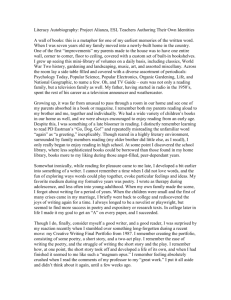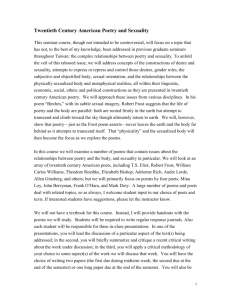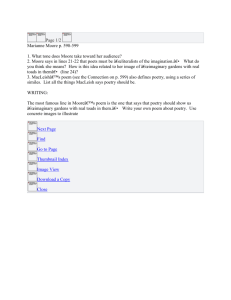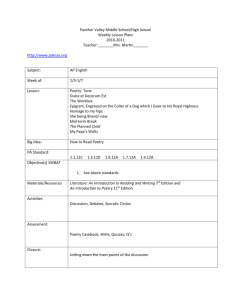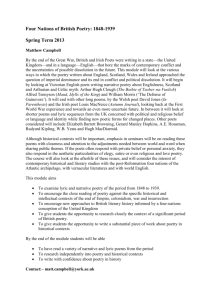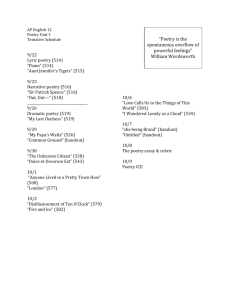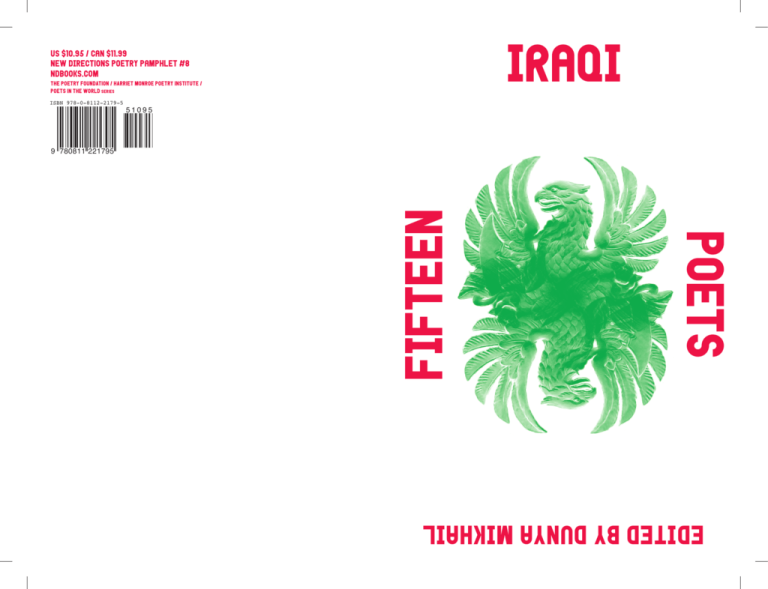
IRAQI
us $10.95 / cAn $11.99
new dIrections poetry pAmphlet #8
ndbooks.com
the poetry foundation / harriet monroe poetry institute /
poets in the world series
,6%1
poets
fIfteen
edIted by DunyA mIkhAIl
This document contains a small sample of poems from Fifteen Iraqi Poets, edited
and introduced by Dunya Mikhail and published by New Direction Publishing
with The Poetry Foundation. The full pamphlet offers a selection of poems
from fifteen notable Iraqi poets and includes poems from Badr Shakir al-Sayyab,
the illusive Mahmoud al-Braikan, as well as one of “Iraq’s free-verse pioneers”
Adbul Wahab al-Bayati.
Fifteen Iraqi Poets is available now for purchase in print.
N E W D I R E C T I O N S P O E T RY PA M P H L E T S
#1Susan Howe: Sorting Facts; or, Nineteen Ways
of Looking at Marker
#2Lydia Davis / Eliot Weinberger: Two American Scenes
#3 Bernadette Mayer: The Helens of Troy, NY
#4 Sylvia Legris: Pneumatic Antiphonal
#5 Nathaniel Tarn: The Beautiful Contradictions
#6 Alejandra Pizarnik: A Musical Hell
#7H.D.: Vale Ave
#8 Forrest Gander: Eiko & Koma
#9 Lawrence Ferlinghetti: Blasts Cries Laughter
#10 Osama Alomar: Fullblood Arabian
#11 Oliverio Girondo: Poems to Read on a Streetcar
#12 Fifteen Iraqi Poets (ed., Dunya Mikhail)
Edited by Dunya Mikhail
New Directions Poetry Pamphlet #12
The Poetry Foundation/Harriet Monroe Poetry Institute/Poets in the World series
Copyright © 2013 by The Poetry Foundation. All rights reserved.
The copyright in each individual poem and translation remains with their respective rightsholders. Further copyright information can be found on page 62.
Except for brief passages quoted in a newspaper, magazine, radio, television, or website review,
no part of this book may be reproduced in any form or by any means, electronic or mechanical,
including photocopying and recording, or by any information storage and retrieval system,
without permission in writing from the Publishers.
Cover design by Office of Paul Sahre
Interior design by Eileen Baumgartner and Erik Rieselbach
Manufactured in the United States of America
New Directions Books are printed on acid-free paper.
First published as New Directions Poetry Pamphlet #12 in 2013
Library of Congress Cataloging-in-Publication Data
Fifteen Iraqi poets / edited by Dunya Mikhail.
pages cm. — (New Directions poetry pamphlet ; #12)
ISBN 978-0-8112-2179-5 (alk. paper)
1. Arabic poetry — Iraq — Translations into English. 2. Arabic poetry — 20th century — Translations
into English. 3. Arabic poetry — 21st century — Translations into English. I. Mikha’il, Dunya,
1965– editor of compilation.
PJ8044.5.E5F44 2013
892.7'160809567—dc23 2013030598
Fifteen Iraqi Poets is a copublication of the Poetry Foundation and New Directions Publishing
Corp. This book is published as part of the Poets in the World series created by the Poetry
Foundation’s Harriet Monroe Poetry Institute.
“The Poetry Foundation” and the Pegasus logo are registered trademarks of The Poetry Foundation. For more information about The Poetry Foundation, please visit www.poetryfoundation.org.
10 9 8 7 6 5 4 3 2 1
New Directions Books are published for James Laughlin
by New Directions Publishing Corporation
80 Eighth Avenue, New York, NY 10011
C O N T EN T S
Preface7
1. Badr Shakir al-Sayyab
Rain Song
11
2. Nazik al-Malaika
New Year
18
3. Abdul Wahab al-Bayati
From the Papers of Aisha
22
4. Mahmoud al-Braikan
On Freedom
25
5. Yousif al-Sa’igh
Dinner27
6. Sargon Boulus
Elegy for Sindibad Cinema
30
7. Saadi Yousef
Cavafy’s Residence
34
8. Fadhil al-Azzawi
Spare Time
37
9. Sherko Bekas
Separation41
10. Hasab al-Sheikh Ja’afar
God’s Palm Tree
43
11. Ronny Someck
Jasmine: Poem on Sandpaper
47
12. Taleb Abd al-Aziz
My Brother’s War
49
13. Ra’ad Abdul Qadir
His Life
53
14. Abdulzahra Zeki
The Guard
55
15. Siham Jabbar
Like Hypatia in Ancient Times
57
Acknowledgments61
PR EFAC E
As I was putting together this mini-anthology, I learned something
very exciting about the history of Iraqi poetry. But before I share my
little discovery, I want to emphasize that what I learned relates not
only to these fifteen poems but to the many other poems I read in
making this slim selection. It was a nearly impossible task trying to
pick only fifteen grains of sand from a shimmering desert. There is a
saying in my country that if you throw a stone in Iraq, it will likely fall
onto the head of a poet! In his poem “Nothing but Iraq,” Mahmoud
Darwish writes, “For poetry is always being born in Iraq, so become
Iraqi to become a poet, my friend.” Beginning in the 1940s, when the
free-verse movement started in my homeland and gradually spread
to other Arab countries, a major topic of discussion in the Arab literary world has been the “legality” or “illegality” of breaking the rules
of classical poetry known as a’muudi. The metrical rules of a’muudi
were set by Al-Khalil ibn Ahmad al-Farahidi in the eighth century. AlFarahidi established sixteen meters of verse for poets to follow, each
rhythmic pattern — called bahr or “sea” — included a hemistich in each
line as well as end rhymes. Today, the free verse of Arabic poetry still
makes use of rhyme, while the poetic line is open to more rhythmic
flexibility without the hemistich and varies in length. The prose poem
in Arabic has completely broken with classical forms. Writers of prose
poetry have defended their work against accusations that “this is not
poetry,” saying their poems contain a more organic “inner rhythm.”
What I discovered as I read more and more poems is that modern
Iraqi poetry is a natural continuation of Sumerian poetry, and that
classical a’muudi verse is in fact a tradition that branched from the
river of Iraqi poetry. The words from Sumer in southern Iraq were
our first cries of poetry, etched in a cuneiform script onto clay tablets,
7
the lines unfolding in one long prose poem without rhymes but with
an “inner rhythm.” The texts are shaped by a narrative, but the repetition of lines and the intensity of images are unmistakably lyrical.
Most of the narratives are broken into fragments, though it is often
impossible to discern if the fragmentation is intentional or due to
missing or crumbling tablets. Sumerian poetry is inherently metaphorical, its metaphors naturally surfacing from primitive images
and symbols used to convey complex ideas. The language lost some
of its original metaphorical vividness as it evolved into Akkadian and
other Semitic equivalents. In modern times the rediscovery of the
writings of Sumer only dates back to the mid-nineteenth century.
Features of Sumerian poetry reappear in the DNA of modern
and contemporary Iraqi poetry. Its myths and symbols apparent in
the writings of the pioneering poets Badr Shakir al-Sayyab and Abdul
Wahab al-Bayati, and these codes became indicators of modernity.
Living in a state of continuous wars and massacres, Iraqi poets have
often lamented the destruction of their country with a common
opening plea: “O Iraq.” This longing directed to ruined cities was
very common in Sumerian poetry. For instance, such pleas in one
text titled “Lamentation on the Destruction of Ur” is directed sometimes to the place without naming it (“O my city,” “O my house”)
and other times to named cities (“O Nippur,” “O Isin,” “O Eridu,”
“O Uruk”). The “Lamentation” consists of eleven songs totaling 436
lines, the fifth and sixth songs describing the destruction of Ur as a
“devastating storm.” Delving into our recent collective memory, one
recalls that the First Gulf War was code-named Operation Desert
Storm by the U.S. government. Both usages of “storm” were figurative as war was the real cause of destruction in both cases. The
eleventh song is a prayer to Nanna to restore the Sumerian people
to their homeland, Ur.
To feel threatened by the new forms of modern poetry was easier
than bringing the dead back to life. The oral culture of Arab society
8
contributed to the popularity of a’muudi poetry, which spread
through recitation (ilqa’) rather than through reading. Many of the
poets were illiterate and the strict meters carried their verses along.
Some a’muudi lyrics are filled with playful rhythms and powerful
images that, when chanted or sung, make listeners’ heads sway with
the feeling of tarab (“pleasing to the ear”). The phenomenal singer
Um Kalthoum popularized many of these tunes, as well as the poets
of her generation who penned them. A’muudi poetry is also closer
to the Quran musically, making it more familiar to Arab ears. The
codes of the Sumerian poetic tradition were totally unfamiliar to
modern-day Iraqis, even after they became readable. The pioneers
and innovators of our new poetry were perhaps more influenced by
the poetry of the Americas than by Sumerian poetry, but their fruits
have the unmistakable taste of the Sumerian tree.
dunya mik hail
9
4.
O N F R EE D O M
mahmo u d a l-braika n
Translated from the Arabic by Haider al-Kabi and Rebecca Carol Johnson
You called on me to discover
another continent,
but denied me a map.
I’d rather sail in my little boat
so that if we should meet
it will be worth remembering.
You offered me a house
furnished and comfortable
in exchange for a song
that meets your demands.
I’d rather stay on my swift horse
and roam
from one gust of wind
to another.
You brought me a new face
beautiful, perfectly proportioned.
I thank you
but I’d rather not have a glass eye
or a plastic mouth.
I have no desire to rid my face of its difference,
nor do I care much for symmetry.
I thank you
but let that distinction remain.
At heart is the slave master not also a slave?
25
•
Everything about Mahmoud al-Braikan (1931–2002) inspired curiosity:
his poetry, his life, his death. He used to hide his poems in a safe so
that others couldn’t publish them. The few poems that circulated
among his peers were enough to elevate him into the ranks of modern innovators. He rarely spoke in public or gave interviews. “A poet
dies twice: Once when he is published, and once when a statue is
erected in his name,” al-Braikan said in a speech about Badr Shakir
al-Sayyab. (A statue of al-Sayyab was constructed in 1972 at the Basra
Corniche.) He chose a life of isolation during the Gulf Wars when
many writers were in the business of “battle mobilization.” His distance from literary and social activities, and his silence, was interpreted by some as an uncompromising stance against dictatorship,
by others as passive disengagement. In the end, his silence might not
have been golden, but his poetry will always be a rare, precious stone.
“On Freedom” was written under the watchful eye of the Iraqi
dictatorship. In exchange for propagandistic support, the government frequently offered a house and other privileges to well-known
poets, though it was unclear what this support implied and to accept
it meant to blindly follow the government's directives. To preserve
one’s freedom and individuality could come at a high cost, and yet
in this poem al-Braikan playfully affirms this freedom to choose.
Al-Braikan studied law at the University of Baghdad, though he
never did anything with this degree. Instead, he taught Arabic language and literature at the Teachers Training College in Basra until
he retired in the 1990s. He was also an accomplished calligrapher and
judged many poetry contests for Basra secondary schools. On February 28, 2002, al-Braikan was killed in his home in Basra, apparently by
thieves. He is buried near his friend, the poet Badr Shakir al-Sayyab.
26
9.
S EPA R AT I O N
s herko bekas
Translated from the Kurdish by Reingard and Shirwan Mirza
If they deprive my poems
of flowers
one of my seasons will die.
If they deprive my poems
of my beloved
two of my seasons will die.
If they deprive my poems
of bread
three of my seasons will die.
If they deprive my poems
of freedom
my whole year will die
as will I.
41
•
Sherko Bekas was born in 1940 in Sulaimaniya, Kurdistan, in northeast Iraq. His father was the popular Kurdish poet Fayak Bekas. In
1965 Bekas joined the Kurdish freedom fighters and worked at the
movement’s radio station, the Voice of Kurdistan. Due to political
pressure, he left Iraq in 1986 and settled in Sweden. The following year
he received the Tucholsky Scholarship from the Swedish PEN Center.
In 1991 he returned to Kurdistan to support the Kurdish National Uprising. Bekas was nominated as a member of parliament and served
as the first minister of culture in Kurdistan, a position he held for a
year before resigning. He has published more than thirty books, all in
Kurdish, and most have been translated into Arabic. A three-volume
edition of his poetry in Kurdish was published in Sweden in the 1990s.
A pioneer of modern Kurdish poetry, Bekas is known for introducing
a free-form style called ruwanga (vision) as well as the “poster poem”
into Kurdish poetry — short, intense, often epigrammatic poems with
an urgent tone, like warm sandwiches eaten on the go. Bekas lived in
Sulaimaniya and was president of Sardam Publishing House.
The Kurds are known for their deep fondness for nature — their
history and traditional Yazidi religion are rooted in the Zagros Mountains, the many caves of which they’ve escaped to during times of
war. Bekas’s poetry treats nature not simply as something beautiful
but as context for philosophical thought. Readers can find a whole
garden in a poem of his where the flowers, the trees, and the birds
serve as an archival memory for the suffering of a nation. In his will,
Bekas has asked to be buried in Azadi Park, Sulaimaniya’s largest
public park, “so that young lovers who visit the park can stop by my
grave.” Municipal officials, however, say this is not legal. While this
pamphlet was being typeset, Bekas passed away on August 4, 2013.
42
12.
M Y BROT H E R ’ S WA R
taleb a bd al-a z iz
Translated from the Arabic by Haider al-Kabi
Get up, brother, the war is over.
They have taken your tank to the smelter
but your rifle still lies on the mountain.
At last, the sand has erased your courage
and farmers plant fields where you fell.
The trees that you planted
have died. The enemy has taken the mountain
you vowed you would never abandon.
From its ice-covered summit
they’ve lowered your banner, which was raised
until your downfall.
They’ve plundered your uniform and your splendor
and no matter how dead you were
they kept riddling your corpse with their bullets.
Though worms crawled out of your eyes
and your large heart, they still couldn’t
believe you were dead —
you had been their worst nightmare.
Get up, brother, the war is over.
The children have surrounded the garden.
The balls of flaming metal
have expired, and the children
now kick them around —
save the one ball that fell beside you
49
and tore your body apart.
We’re back in the village now,
without wars and without enemies.
Horizons of dewy nightingales
surround our pillows.
Slowly, we’re forgetting our old wounds,
and though our daggers bring back memories,
all we really want
is for our dogs not to bark at anyone
except our guests.
My mother is still in bed.
I spoke with her of your height and your strong arms,
how delighted she was
when they couldn’t find any shoes that would fit you.
She asked me
how you were sleeping
and I was filled with sorrow to tell her
that you hadn’t slept for seven years,
that a shell from an enormous gun
shattered your ribs
and stripped you of your youth.
So I let the sun set
upon your names and dreams,
put to rest the settled dust
you have become.
Between your life, your death, there is
a distance of six children.
50
•
Taleb Abd al-Aziz was born in 1953 in Basra, a city in southern Iraq
full of palm trees, boats, and reed houses on rivers. His poetry is
inspired by the city’s history, as well as the history of his ancestors
and his family. Even the title of “My Brother’s War” combines the
personal with the public, while the subtle, quiet lines evoke deep
sorrow. Though a personal elegy, the poem’s central theme echoes
the ancient epic of Gilgamesh, the brother who has been killed reminding us of Gilgamesh’s close friend Enkidu who was a hero but
was killed by an illness inflicted by the gods. Al-Aziz’s older brother
was killed in 1988 in the Iran-Iraq War; he was only a few meters
away from al-Aziz while they were both fighting in the First Battle
of al-Faw. “Is it because death mistook me?” al-Aziz asks in another
poem. “Perhaps we just exchanged roles in death’s story,” he told me.
“I couldn’t take his corpse away until a week later. He was felled in a
minefield. While worms crawled out of his body, I carried him to the
center of the city where they were collecting the dead. I became responsible for supporting his wife and raising his six children, though
I had my own family to take care of. My mother abandoned her bed
and slept on a palm mat on the floor. How could she sleep on cotton,
she said, when her son sleeps in dirt?”
Al-Aziz works as a journalist and writes a weekly column for AlMada magazine. His father was a farmer, and al-Aziz still lives in the
house of his birth. “There are places around our orchard,” he told
me, “where I can still see my brother climbing a tree, or bathing.
He was strong, and so tall that they didn’t have boots of his size in
the military.” Like his brother and most Iraqi men of that generation, al-Aziz was involuntarily drafted in the war. In battlefields from
Kurdistan in the north to al-Faw in the south, he witnessed the death
of many of his relatives and friends. “My Brother’s War” was written
51
in 1993, on the fifth anniversary of his brother’s death. He said, “I
wrote the poem in fifteen minutes but with burning tears.” Al-Aziz’s
poetry books include Tariikh al-Asaa (The History of Sorrow, 1994)
and Qabla Kharab al-Basra (Before Basra’s Ruin, 2012).
52
13.
HIS L IF E
ra’ ad abdu l q a dir
Translated from the Arabic by Dunya Mikhail
At the moment
of the bridge
of crossing
of the shadow
of the step
of the rhythm
of the echo
of the trace of life.
At the moment
of sleep on the other shore
I am the man at the moment of crossing to the shore of sleep
I am the woman not reached by the man at the crossing
I am the sleep
I am the sleep on the other shore
I am the echo
the trace
the shadow
the crossing
the bridge
at the moment of
my life.
53
•
What I love about the poetry of Ra’ad Abdul Qadir (1953–2003) are
the small details that become reference points to essential truths, as if
they are atoms quietly and dynamically moving together in a simple
yet profound meaning. The landscape of his poetry is fertile, so as
soon as Qadir skillfully sows a poetic seed, many questions emerge.
Play is important in his poetry, but what’s particularly special about
the game is that you can reassemble the parts differently every time,
thus discovering new things by chance.
Qadir died from a heart attack when he was fifty — the windows
of his home were thrown open at the moment of his death. “Ra’ad
didn’t like to write on a table. He would write in bed,” his wife, Ilham,
said to her guests after the funeral. She gave some of his friends a
stack of his papers and notebooks in which they found eleven unpublished poetry collections. During his lifetime, he'd published only
half of what he had written. “His Life” is part of a longer sequence of
poems called “Letters to the Other Shore.” Qadir’s books include Maraya al-As’ila (Mirrors of Questions, 1979), Jawai’iz al-Sana al-Kabisa
(Prizes of the Leap Year, 1995), Opera al-amira al-da’ia’ (Opera of the
Lost Princess, 2000), and Saqr fawqa ra’sihi shams: a’sr al-tasliya (Eagle
with Sun Overhead: The Age of Entertainment, 2006). He earned
a doctorate in Islamic history from the University of Baghdad and
worked as the managing editor of the literary magazine Al-Aqlam.
54
14.
T HE G UA R D
ab d u lz ah ra z eki
Translated from the Arabic by Khaloud al-Muttalibi
The guard behind me
is also beside me and in front of me.
The guard who accompanies me
sometimes precedes me
and other times lingers
unseen, my shadow.
The guard who was born with me
through my long sleep was awake
for every second.
I drank from his glass.
He ate from my plate.
He was there between myself and a road
I never walked.
He was there between my tongue and words
I never spoke.
During the war, he was there between my finger
and the trigger of the gun.
The guard back then
didn’t care about the world,
still young, he is
obsessed with me
wary of me
as he watches
I guard him, afraid
he might grow old.
55
•
Abdulzahra Zeki was born in 1955 in Amara in southern Iraq, and
currently works as a cultural adviser for the Department of Cultural
Affairs in Baghdad. “The Guard” is from his fifth poetry collection,
Silent Tape: Words About Cars, Bullets, and Blood, published in 2011.
The book is composed of short documentary poems about the U.S.
occupation of Iraq that began in 2003. Unlike his earlier, more geographically expansive poems, this collection conveys a suffocating
sense of urgency as it chronicles daily events in Baghdad. The guard
in his poem wants to protect and to be protected, while life is but
a deferment of death. “I walk from home to work not knowing in
what moment the explosion will happen,” Zeki once said to me. One
day he left his office for lunch with two colleagues, and while eating
at a restaurant they heard a loud explosion. It turned out that a bomb
had fallen on their office building. He said, “I later saw that the bomb
had actually penetrated the wall where I used to sit in my office, and
pieces of it were all over the floor.” In those daily moments of facing
death and escaping it, Zeki imagines a guard that accompanies him
at all times and then he expresses fear that this guard, like everybody
else, would get old. The concern is doubled: fear for one’s own age
(if the guard is his own self ) and fear for one’s life with lack of protection (if the guard is another self and would eventually die after
getting too old). Zeki explains, however, that the guard symbolizes
his consciousness that protects him from other forms of death. The
guard “was awake” and that perhaps was what saved the poet.
56
ACK NOW L E D GME N T S
My thanks to Ilya Kaminsky for his invitation to edit this Poets in
the World series pamphlet of fifteen Iraqi poets as part of the Poetry Foundation’s Poetics of Six Continents program, which began
as a three-month correspondence with the poet Katie Ford. Her
questions about Iraq’s poetic traditions opened my eyes to issues I
had never even thought about before. As part of this program, Ford
wrote an important essay about the poetics of Iraq that was too long
to include in this publication.
I am deeply grateful to Jeffrey Yang for his tremendous editorial
work and patience, and to Barbara Epler, who is among the few publishers in the U.S. dedicated to international literature.
Lastly, I would also like to thank all the poets and translators for
their contribution.
61
“Rain Song” by Badr Shakir al-Sayyab, translated by Lena Jayyusi and Christopher Middleton from
Modern Arabic Poetry: An Anthology, edited by Salma Khadra Jayyusi. Copyright © 1987 Columbia
University Press. Reprinted with permission of the publisher.
“New Year” by Nazik al-Malaika, translated by Rebecca Carol Johnson. Reprinted by permission
of the translator.
“From the Papers of Aisha” by Abdul Wahab al-Bayati, translated by Bassam K. Frangieh. From Love,
Death, and Exile: Poems Translated from Arabic, Abdul Wahab al-Bayati, p. 271. Copyright 1991 by Georgetown University Press. Reprinted with permission. www.press.georgetown.edu.
“On Freedom” by Mahmoud al-Braikan, translated by Haider al-Kabi and Rebecca Carol Johnson.
Modified from “Of Freedom” by Mahmoud al-Braikan, translated by Haider al-Kabi from Flowers
of Flame, Unheard Voices of Iraq, ed. Sadek Mohammed, Soheil Najm, Haider al-Kabi and Dan Veach
(Michigan State University Press 2008). Reprinted by permission.
“Dinner” by Yousif al-Sa’igh. Modified from “Supper,” translated by Saadi Simawe in Iraqi Poetry
Today, edited by Saadi Simawe and Daniel Weissbort. Reprinted by permission of the translator.
“Elegy for Sindibad Cinema” by Sargon Boulus, translated by Sinan Antoon. Modified from “An
Elegy for Sindibad Cinema” from Azma Ukhra li-Kalb al-Qabila (Another Bone for the Tribe’s Dog, Baghdad
and Beirut: Dar al-Jamal,2008). Originally published on Jadaliyya.com. Reprinted by permission.
“Cavafy’s Residence” by Saadi Yousef, translated by Ferial J. Ghazoul in Troubled Water, edited by
Ferial J. Ghazoul (Al-Mada, Syria, 1995). Reprinted by permission.
“Spare Time” by Fadhil al-Azzawi, translated by Khaled Mattawa. Modified from “In My Spare
Time” by Fadhil al-Azzawi, translated by Khaled Mattawa from Poetry International Web. Reprinted
by permission.
“Separation” by Sherko Bekas, translated by Reingard Mirza and Shirwan Mirza. Reprinted by
permission.
“God’s Palm Tree” by Hasab al-Sheikh Ja’afar, translated by Rebecca Carol Johnson and Dunya
Mikhail. Reprinted by permission.
“Jasmine: Poem on Sandpaper” by Ronny Someck. Modified from “Jasmine. Poem About SandPaper,” translated by Moshe Dor and Barbara Goldberg in The Fire Stays in Red by Ronny Someck. ©
2002 by the Board of Regents of the University of Wisconsin System. (The Fire Stays in Red was copublished by the University of Wisconsin Press with Dryad Press.) Reprinted by permission.
“My Brother’s War” by Taleb Abd al-Aziz, translated by Haider al-Kabi modified from “My Brother’s
War” by Taleb Abd al-Aziz, translated by Haider al-Kabi from Flowers of Flame, Unheard Voices of Iraq,
ed. Sadek Mohammed, Soheil Najm, Haider al-Kabi, and Dan Veach (Michigan State University Press
2008). Reprinted by permission.
“His Life” by Ra’ad Abdul Qadir, translated by Dunya Mikhail, from “Letters of the Other Shore”
by Ra’ad Abdul Qadir (Elaph.com). Reprinted by permission.
“The Guard” by Abdulzahra Zeki, translated by Khaloud al-Muttalibi. Modified from “The Bodyguard” by Abdulzahra Zeki, translated by Khaloud al-Muttalibi from Silent Tapes: Words About Cars,
Bullets, and Blood (Al-Mada, Baghdad, 2011). Reprinted by permission.
“Like Hypatia in Ancient Times” by Siham Jabbar, translated by Soheil Najm. Reprinted by
permission.
Translations of all poems except “Rain Song” have been revised for this publication.
Great efforts have been made to credit and obtain permission for third-party material included in this book. If we have made any errors or omissions please write to
us at The Poetry Foundation, 61 West Superior Street, Chicago, IL 60654, and we
will endeavor to make any appropriate corrections at the next available opportunity.
62
Fifteen Iraqi Poets is part of a collaboration with the Poets in the World series created by
the Poetry Foundation’s Harriet Monroe Poetry Institute. The Poets in the World series supports research and publication of poetry and poetics from around the world
and highlights the importance of creating a space for poetry in local communities.
The Harriet Monroe Poetry Institute is an independent forum created by the Poetry
Foundation to provide a space in which fresh thinking about poetry, in both its intellectual and practical needs, can flourish free of allegiances other than to the best
ideas. The Institute convenes leading poets, scholars, publishers, educators, and other
thinkers from inside and outside the poetry world to address issues of importance
to the art form of poetry and to identify and champion solutions for the benefit of
the art. For more information, please visit www.poetryfoundation.org/institute.
The Poetry Foundation, publisher of Poetry magazine, is an independent literary
organization committed to a vigorous presence for poetry in our culture. It exists
to discover and celebrate the best poetry and to place it before the largest possible
audience. The Poetry Foundation seeks to be a leader in shaping a receptive climate
for poetry by developing new audiences, creating new avenues for delivery, and
encouraging new kinds of poetry through innovative partnerships, prizes, and programs. For more information, please visit www.poetryfoundation.org.
harriet mo nroe poetry institute
poets in the world series
Publications
Ilya Kaminsky, 2011–2013, HMPI director
Poets in the World series editor
Another English: Anglophone Poems from Around the World, edited by
Catherine Barnett and Tiphanie Yanique (Tupelo Press)
Elsewhere, edited by Eliot Weinberger (Open Letter Books)
Fifteen Iraqi Poets, edited by Dunya Mikhail (New Directions Publishing)
“Landays: Poetry of Afghan Women” edited by Eliza Griswold (Poetry
magazine, June 2013)
New Cathay: Contemporary Chinese Poetry, edited by Ming Di (Tupelo Press)
Open the Door: How to Excite Young People about Poetry, edited by Dorothea
Lasky, Dominic Luxford, and Jesse Nathan (McSweeney’s)
Pinholes in the Night: Essential Poems from Latin America, edited by Raúl
Zurita and Forrest Gander (Copper Canyon Press)
Seven New Generation African Poets, edited by Kwame Dawes and Chris
Abani (Slapering Hol Press)
Something Indecent: Poems Recommended by Eastern European Poets, edited by
Valzhyna Mort (Red Hen Press)
The Star by My Head: Poets from Sweden, coedited and translated by Malena
Mörling and Jonas Ellerström (Milkweed Editions)
The Strangest of Theatres: Poets Writing Across Borders, edited by Jared
Hawkley, Susan Rich, and Brian Turner (McSweeney’s)
Katharine Coles, HMPI inaugural director
Blueprints: Bringing Poetry into Communities, edited by Katharine Coles
(University of Utah Press)
Code of Best Practices in Fair Use for Poetry, created with American
University’s Center for Social Media and Washington College of Law
Poetry and New Media: A Users’ Guide, report of the Poetry and New Media
Working Group (Harriet Monroe Poetry Institute)


